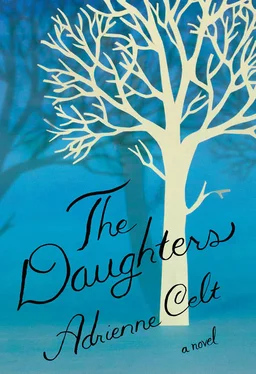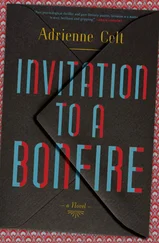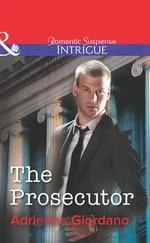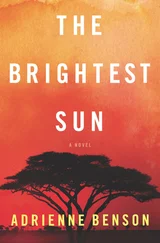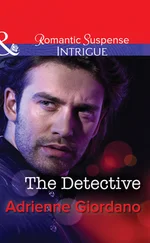But I was young and single-minded and didn’t want to learn. Walking from the train on the way to my first rehearsal, I dragged my feet, scraping the toes of my once-polished Mary Janes. It was March, and gray snow still gathered in the corners of the streets where it had been thrown by snow blowers over the course of the winter. The sidewalk was perpetually wet and salted, and my shoes were already near ruin, white-streaked and saturated.
Baba Ada seemed to have decided to ignore my attitude and walked in brisk steps, her nose pointed upward into the crisp air. She held my hand, my cotton gloves sticking against the mended suede of her own. And she quizzed me on sounds, quick, like a drill sergeant.
This was a game Ada had devised, based on her assumption that my whole body — mouth, lungs, brain, and tiny ear bones — had operated as a precision instrument from the time of my birth, and perhaps before. Very likely she whispered to my mother’s pregnant stomach and listened for phantom reactions, as if her very hope was sonar.
The game was simple. If we were sitting in a restaurant and someone accidentally struck their knife against a glass, Ada would turn to me with an expectant gaze until I said “B minor?” Or whatever the note might be. That was how I won.
Perfect pitch, to Ada, was part of my birthright, written in my blood. Which wasn’t to say I could be casual about it. She was irritated if I hummed a song just a shade flat in her presence, even if I was mimicking something I’d heard on the radio. And since she was proud, she liked to show me off. In church I named the organist’s key changes; walking down the street with Ada and one of her friends, I called out the different pitches of car horns. People laughed and admired me and handed me candy. Adults, anyway; none of the hauteur or exactitude I learned from Ada earned me many friends at school. But I didn’t mind, because I had her. Once, when I was ten, a waiter in a café dropped an entire tray of glasses near our table, and when the shock in the room wore off I said to Ada, “Shostakovich?” She stared at me for a moment and then laughed so hard her eyes leaked tears, which cut tracks through the pale powder on her face. Then she signaled the clumsy waiter back and ordered a piece of chocolate cake, which we shared, occasionally breaking into renewed giggles.
On this day, however, as I sulked along the sidewalk, she pointed to things — a squeaky gate hinge, a bookshop’s entrance bell — without so much as a command, and I named them in an insolent monotone.
Near the entrance to the small rehearsal room, which we reached by way of an alleyway door and a dusty hallway that wove through the church, a round-cheeked woman stood, taking names as each participant arrived. She was particularly tall, milling around with the adult chaperones, so I could see the ribbed archway inside her mouth when she threw back her head and laughed. In the middle of such a laugh, without warning, she sneezed three sharp reports from her nose, and I felt a creeping sensation up the back of my neck. I turned to glare at Ada, hoping that my expression would communicate something cutting. See, I’m going to catch my death of cold. But she just shooed me forward.
I placed myself on a low stool and watched the other children. The boys had formed a pack to one side, leaving only their backs visible from where I sat. The girls simply looked uninterested — one was zipping and unzipping her jacket, while another slowly unraveled her glove.
“All right!” The sneezing woman, who seemed to be in charge, looked at her watch and walked to the front of the room, hopping up on a small wooden box. “I’m Mrs. Baker. You can call me Noreen, or Noree.” She beamed at us and wiped her nose with one finger. My stomach pinched slightly, but I stayed still. Baba brought me here , I thought. She must have known this woman, must have trusted her.
“ Hi, Noree .” The children around me all spoke in unison, as if they’d been prepared for this exact interaction, this bubbly woman standing before us. The boys had assumed seats, interspersed with the girls, and looked calm and composed.
“Now tonight we’re not going to start with anything too tricky. Remember, we’re here to have fun.” I shifted in my seat. “I know it’s almost springtime,” Noreen continued, “so first I thought we’d do one of my favorites. You might know it. It’s called ‘I’ll Be a Sunbeam.’”
As she spoke, Noreen hopped off her box and walked around the room with a stack of pink and yellow mimeographed papers. She handed one to each child and gave a few to the adults who were shifting from foot to foot in the back of the rehearsal space. My paper was yellow and slightly smudged. It smelled like old silverware. In the top right corner was a picture of a grinning sun, and below that was a list of verses intercut with the chorus.
Ada was only beginning to teach me to read, but I didn’t need to read to see that something was wrong. I raised my hand.
“Yes, sweetheart?” Noreen smiled at me and bent down, putting her hands on her knees. I tried to lean away imperceptibly, but this only caused her to move closer.
“Where’s the music?” I asked.
“Honey, it’s right there in your hand.”
“No, it’s not.”
“Yes, honey, it is.” Noreen reached out and took the page from my fingers, wagging it in front of me. “See?”
I pinched my lips together and nibbled on them slightly. Ada was always telling me to be polite, but she never let me talk nonsense to her either. And this woman was talking nonsense.
“That’s just words.”
Noreen stood straight and looked at me.
“What’s your name, honey?”
“Luscia.”
“Well, Luscia, what a pretty name. You see, these are the words that go with the music. So I’m going to play the piano, and we’ll all sing these words along and make the song. Okay?”
She smiled at me again, and I could tell she thought that I didn’t understand. But as I glared with all my childish might, her face took on an aspect of bland menace, something shifting below the surface and recategorizing me as trouble. Noreen gave a short nod and turned back towards the group, opening her mouth to give further directions.
Well, fine, I thought. Or something like it. Some inarticulate, foot-stamping approximation of indignation and despair. If she wanted trouble I could certainly provide it.
My hand shot, shaking, back into the air, but before Noreen could so much as acknowledge it, it was grabbed by a larger, softer version of itself. Baba Ada stood beside me, looking severe, and tugged me to my feet. She turned to Noreen only when we reached the door.
“My apologies. We seem to be in the wrong place.”
“Where are we going?” I asked, once we were safely outside, safely on the train. My relief at escaping Noree and her sickly sweet voice had left me briefly giddy, and now I felt exhaustion creeping up. I was also a bit nervous, having openly and publicly defied my grandmother, rendering dead her plans for my choir career.
I had expected to be dragged straight to my room and left there to think about what I’d done. But we didn’t seem to be heading home. The car creaked below us and I leaned my face against the cool window, watching brief snatches of apartments appear and disappear as we barreled past. People’s lives, here and gone.
“What a revolting woman.” Ada sat beside me and squeezed my wrist. “Although,” she said, looking down at me, “you knew perfectly well what that sheet of lyrics was.”
I took my hand away and fiddled with the collar of my coat, so it pushed my scarf up, warm over my chin.
“I thought you might enjoy it.” Ada spoke as though in response to something I hadn’t said. Her brow was knit. “Your mother thought so too. We should have known.”
Читать дальше
